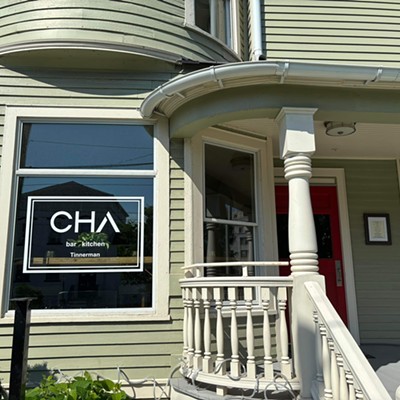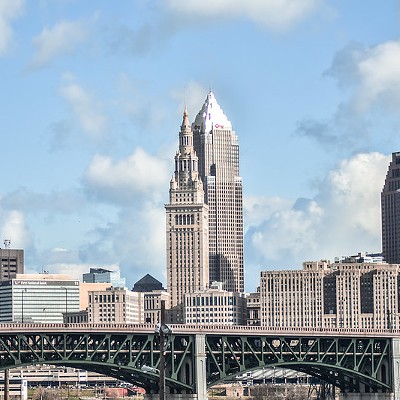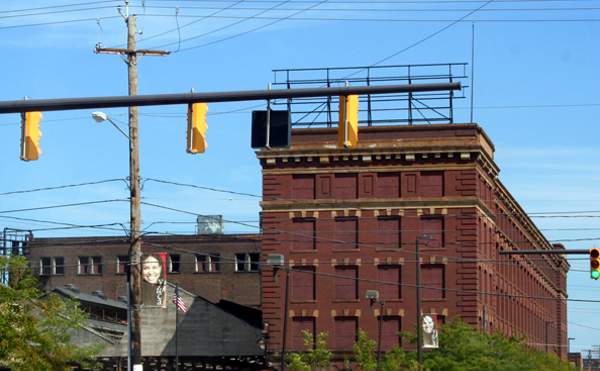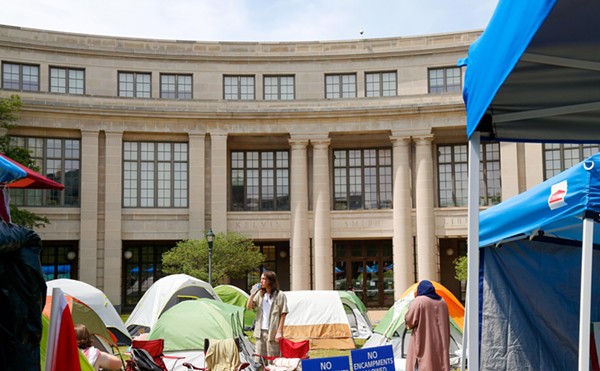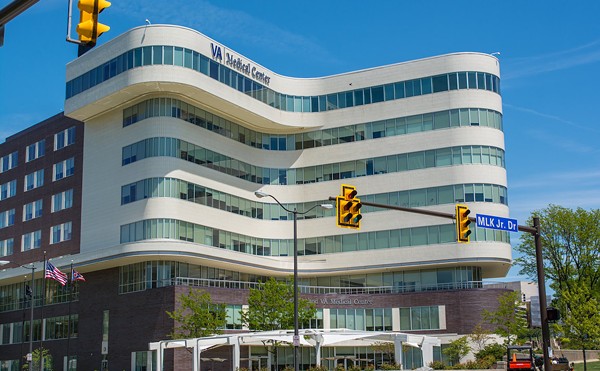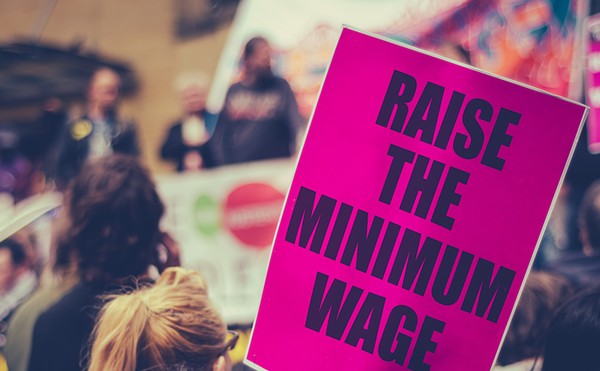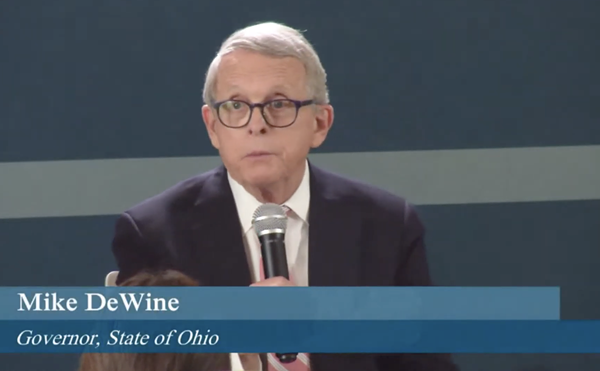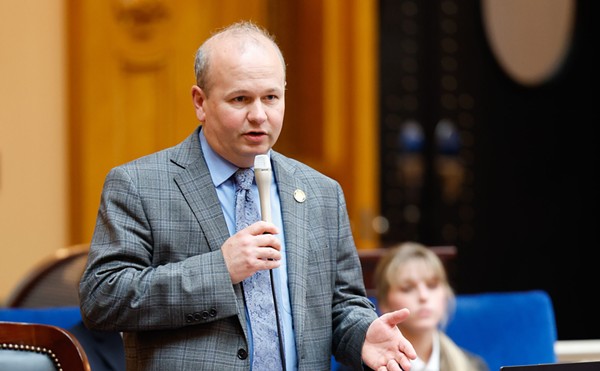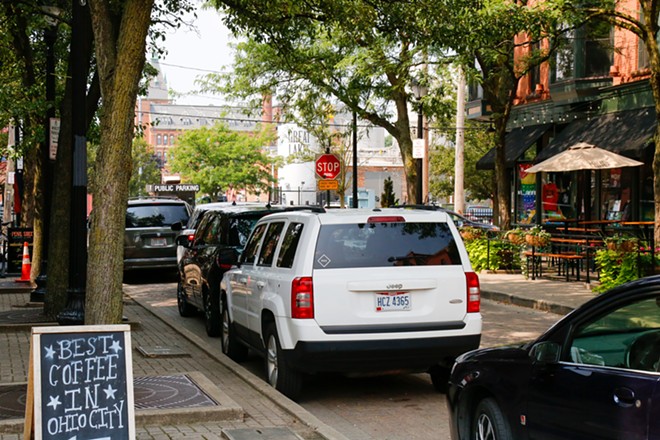
McNair, then five years into his position, was overjoyed that one of his walkability pursuits, the closing of Market Avenue to car traffic, was happening. By June, the street was covered in Astroturf and Adirondack chairs. No longer did lines of SUVs and cars line the curb. Instead, there was sidewalk seating, in the most European image Market Ave had ever seen.
Thousands of dollars spent, and bike racks positioned as a traffic deterrent, McNair rested believing the temporary expansion permit set to expire that September would make way for a permanent block.
"What we all heard from the community was that it was a positive experience," McNair told Scene. "Everyone was in favor."
But, that September, the furniture park was gone. Cars returned.
In the four years since Market Ave.'s brief identity as a pedestrian street, questions as to how to try again to close the avenue off are resurfacing in earnest, as the support for the avenue's permanent closure grows in its collective intent. But, as in 2019, quagmires continue arise.
All the while, business owners today say they're suffering the brunt of the missed opportunity.
"This has been the worst summer in recent memory for the businesses on Market Avenue," Karen Small and Jill Davis, owners of the Pearl Street Wine Market, wrote to City Hall on Monday.
The complaints tear into what seemed to be Mayor Bibb's progressive stance on open streets, while putting pedestrianization center stage: Market Ave. is an "eyesore," it is a 15-minute "parking lot" where "no one is ever ticketed." The traffic is so bad, Small and Davis claim, that the actual lot a block west dedicated for customers is "not even half full" on a Friday night.
"For a small area that boasts one of Cleveland’s jewels, the West Side Market, the careless and really atrocious urban planning is shocking," the letter reads. "Even Mayor Jackson was progressive enough to see the benefits of the street closure."
Other than acting as eye candy for urbanists, pedestrian-only streets are known to be a boon to the area's small business, even, according to one study, boosting store sales by on average of 30 percent. Seasonally carless streets like Mont-Royal Avenue in Montreal, parts of Washington Street in Hoboken, New Jersey, blocks of New York's Fifth Avenue, have all acted as safeguards for the retail economy under one theory: Safer street, more people, more money spent.
In the case of Market Ave., the buy-in to the pros of walkability weren't all well-received. Although he helped pad the street with Astroturf, Greg Bodnar, the then-owner of Koffie Cafe, had clear qualms about ridding Market of cars for good.
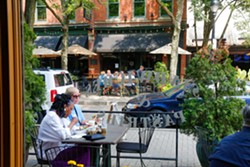
Bodnar claimed in 2019, as he still claims today, that erecting bollards at both ends would disincentivize the customers that drive straight up to Koffie's front door from getting morning coffee. In Bodnar's eyes, that's 20 percent of his revenue.
Especially if it's winter, Bodnar said, and Market is icy. Especially if those customers come with a walker or wheelchair.
"If it's temporary, my customers understand," he said. "But if it's permanent, that's a different story: There's just not enough business on the street to completely shut it down." (Bodnar, to be clear, approves of a pedestrian street, "only from Memorial Day to Labor Day.")
In early 2023, ready to take a step back after 29 years in business, Bodnar began transitioning ownership of Koffie Cafe to Solymar and Elizabeth Marengo. Reached for comment, Solymar suggested that she was open to the idea of pedestrianizing the avenue, mostly to allow for more café seating, yet seemed wary of doubling down on a commitment.
"Right now I don't have, like, 'Yes, we want it. No, we wouldn't'," Marengo told Scene in a call. "We haven't really made that decision yet."
Overwhelming approval, as McNair and his office suggests, seems to be shared among denizens besides Bodnar.
The Conways, owners of Great Lakes Brewing on Market's northern edge, have long been backers of the closure. Karen Small and Jillian Davis, the owners of the Pearl Street Wine Market, are also as eager as McNair to bring Market fully to its people.
Small, who converted the old Flying Fig into a European-style wine-and-cheese eatery last June, said she spent some $120,000 in renovations to, in part, match Pearl's aesthetic with the street Small thought would be equally European.
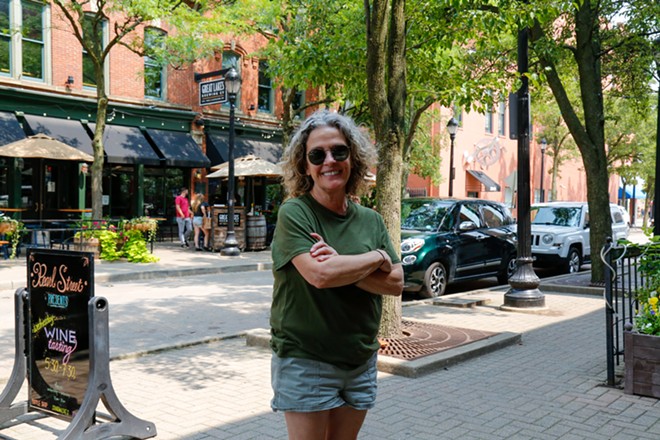
Multiple sources interviewed for this article suggested that, despite full support from Mayor Bibb, City Council and Ohio City Inc., the onus lies on the Mayor's Office of Capital Projects. (MOCAP couldn't be reached for comment.) It's most likely that, although the city is working on pedestrianizing Market Ave. for good, such support is butting heads with preexisting state law, and leading to long delays in Cleveland's own law department.
Four years after he first rallied around a carless avenue, Ward 3 Councilman Kerry McCormack reignited pursuit of yet another seasonal closure in March, with—like always—closing Market down for good. Then, as Small implied, linking it more with the West Side Market. Or, as Ohio City business guru Sam McNulty told Scene, leaning towards shutting off West 25th to cars on summer weekends.
"I've been looking into this for seven-and-a-half years and I fully do not understand why the city cannot close it’s public right of way," McCormack said, referring to the street closure. "I just don’t understand it. I want it. The mayor wants it. The businesses want it. The community wants it. But yet it still hasn't happened."
Subscribe to Cleveland Scene newsletters.
Follow us: Apple News | Google News | NewsBreak | Reddit | Instagram | Facebook | Twitter | Or sign up for our RSS Feed


